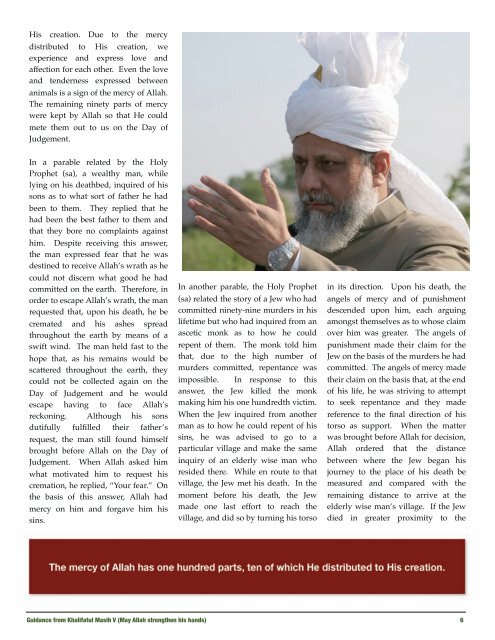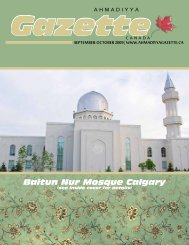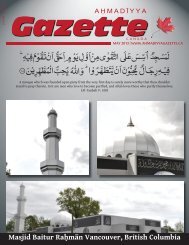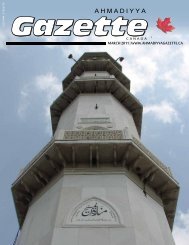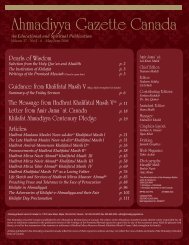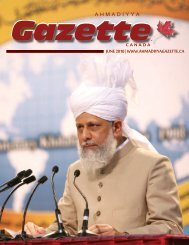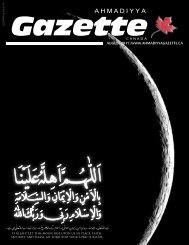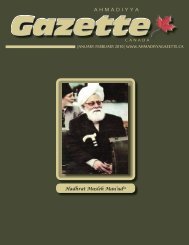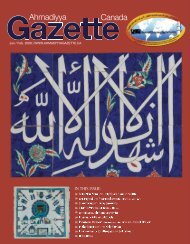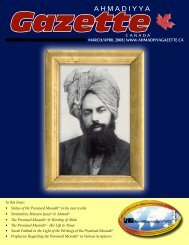Ahmadiyya Gazette Canada
Ahmadiyya Gazette Canada
Ahmadiyya Gazette Canada
Create successful ePaper yourself
Turn your PDF publications into a flip-book with our unique Google optimized e-Paper software.
His creation. Due to the mercy<br />
distributed to His creation, we<br />
experience and express love and<br />
affection for each other. Even the love<br />
and tenderness expressed between<br />
animals is a sign of the mercy of Allah.<br />
The remaining ninety parts of mercy<br />
were kept by Allah so that He could<br />
mete them out to us on the Day of<br />
Judgement.<br />
In a parable related by the Holy<br />
Prophet (sa), a wealthy man, while<br />
lying on his deathbed, inquired of his<br />
sons as to what sort of father he had<br />
been to them. They replied that he<br />
had been the best father to them and<br />
that they bore no complaints against<br />
him. Despite receiving this answer,<br />
the man expressed fear that he was<br />
destined to receive Allah’s wrath as he<br />
could not discern what good he had<br />
committed on the earth. Therefore, in<br />
order to escape Allah’s wrath, the man<br />
requested that, upon his death, he be<br />
cremated and his ashes spread<br />
throughout the earth by means of a<br />
swift wind. The man held fast to the<br />
hope that, as his remains would be<br />
scattered throughout the earth, they<br />
could not be collected again on the<br />
Day of Judgement and he would<br />
escape having to face Allah’s<br />
reckoning. Although his sons<br />
dutifully fulfilled their father’s<br />
request, the man still found himself<br />
brought before Allah on the Day of<br />
Judgement. When Allah asked him<br />
what motivated him to request his<br />
cremation, he replied, “Your fear.” On<br />
the basis of this answer, Allah had<br />
mercy on him and forgave him his<br />
sins.<br />
In another parable, the Holy Prophet<br />
(sa) related the story of a Jew who had<br />
committed ninety-nine murders in his<br />
lifetime but who had inquired from an<br />
ascetic monk as to how he could<br />
repent of them. The monk told him<br />
that, due to the high number of<br />
murders committed, repentance was<br />
impossible. In response to this<br />
answer, the Jew killed the monk<br />
making him his one hundredth victim.<br />
When the Jew inquired from another<br />
man as to how he could repent of his<br />
sins, he was advised to go to a<br />
particular village and make the same<br />
inquiry of an elderly wise man who<br />
resided there. While en route to that<br />
village, the Jew met his death. In the<br />
moment before his death, the Jew<br />
made one last effort to reach the<br />
village, and did so by turning his torso<br />
in its direction. Upon his death, the<br />
angels of mercy and of punishment<br />
descended upon him, each arguing<br />
amongst themselves as to whose claim<br />
over him was greater. The angels of<br />
punishment made their claim for the<br />
Jew on the basis of the murders he had<br />
committed. The angels of mercy made<br />
their claim on the basis that, at the end<br />
of his life, he was striving to attempt<br />
to seek repentance and they made<br />
reference to the final direction of his<br />
torso as support. When the matter<br />
was brought before Allah for decision,<br />
Allah ordered that the distance<br />
between where the Jew began his<br />
journey to the place of his death be<br />
measured and compared with the<br />
remaining distance to arrive at the<br />
elderly wise man’s village. If the Jew<br />
died in greater proximity to the<br />
Guidance from Khalifatul Masih V (May Allah strengthen his hands) 6


